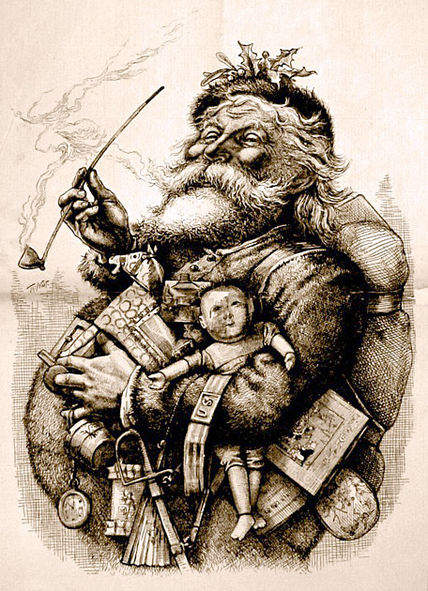
Santa Claus, also known as Saint Nicholas, Father Christmas, Kris Kringle, or simply "Santa", he is the legendary and mythical figure who, in many Western cultures, brings gifts to good children on Christmas Eve, December 24 or on his Feast Day, December 6 (Saint Nicholas Day). The legend may have part of its basis in hagiographical tales concerning the historical figure of Saint Nicholas.

Christ, they say, is being cut from Christmas. And Saint Nicholas, the fourth-century bishop renowned for his secret acts of kindness, has been hijacked by commercialism.
At Christmas, the celebrations of the Christian and secular world overlap, each holding to different heroes who carry slightly contrary messages: Santa Claus gives gifts for those who are good; Jesus Christ is a symbol of unconditional love to believers no matter the sin.
(source of the last 3 paragraphs)
That is just one of the main reasons why he is bad. Read this other reason:
The specific history of the festival serves little purpose except to show that it isn't a Christian origin. The real question is whether or not it is good to propagate this myth at Christmas. These are some characteristics of Santa Claus. He:
- is immortal.
- is omniscient, seeing all things that happen.
- is good and loving.
- can cause miracles.
- rewards people for doing good.
- demands belief that he is real.

These are all attributes that are shared with the Christian view of God. One might ask then, is a belief in Santa Claus equivalent to a belief in a god? To a child's eyes, it must be very similar.
The Effect
One may ask whether it matters about teaching a myth about another God to small children. One could argue that it prepares them to understand the nature of the true God. Alternatively, it may be considered that once the myth is shattered in later years it will become a source of distrust.
One can't help but think of the many references in the Bible to the service to other gods.
Joshua 24:20: "If you forsake the LORD and serve foreign gods, then He will turn and do you harm and consume you after He has done good to you."
Remember the first commandment of God?
ONE: 'You shall have no other gods before Me.'
It may seem pleasant to deceive children with myths about Santa Claus, but one has to ask whether it is really worth the price. (Source)

There are a number of aspects to the whole Santa Claus “system” which children shouldn’t learn to internalize. It implies that the whole person can be judged as naughty or nice based upon a few acts. It requires belief that someone is constantly watching you, no matter what you are doing. It is based upon the premise that one should do good for the sake of reward and avoid doing wrong out of fear of punishment. It allows parents to try to control children via a powerful stranger.

The entire Santa Claus myth is based on the idea of children getting gifts. There’s nothing wrong with getting gifts, but Santa Claus makes it the focus on the entire holiday. Children are encouraged to conform their behavior to parental expectation in order to receive ever more presents rather than simply lumps of coal. In order to make Christmas lists, kids pay close attention to what advertisers tell them they should want, effectively encouraging unbridled consumerism.

The parallels between Santa Claus and Jesus or God are numerous. Santa Claus is a nearly all-powerful, supernatural person who dispenses rewards and punishment to people all over the world based upon whether they adhere to a pre-defined code of conduct. His existence is implausible or impossible, but faith is expected if one is to receive the rewards. Believers should regard this as blasphemous; non-believers shouldn’t want their kids prepared in this way to adopt Christianity or theism.
(source)
=====
Watch this video... 6 year cancer survivor crushes bricks!











1 comments:
Play this Anti-Claus Christmas game! LOL
Post a Comment